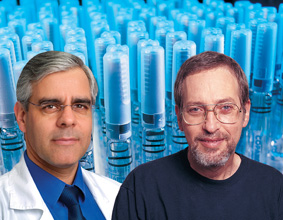These findings may contribute to the development and promotion of the application of personalized drug therapy for multiple sclerosis patients

Prof. Doron Lantz and Prof. Ariel Miller. Tailored medicine
A team of Israeli scientists, from the Technion, the Weizmann Institute of Science and the "Teva" company, recently located genetic characteristics responsible for the good response of multiple sclerosis patients to the drug Copaxone. These findings may contribute to the development and promotion of the application of personalized drug therapy for multiple sclerosis patients.
Copaxone is the first original Israeli medicine approved for use by the US Food and Drug Administration, the FDA, and is currently marketed in more than 40 countries in the world, including the US, Canada, many European countries, Australia, Latin America and Israel.
The drug molecule is the result of the invention of Prof. Michael Sela, Prof. Ruth Arnon, and Dr. Deborah Teitelbaum from the Department of Immunology at the Weizmann Institute of Science. The process of developing it into a drug was done by scientists from the "Teva" company, which also manufactures and markets it.
"Until today, drug treatments for various diseases are based on random selection of doses and times in a 'trial and error' format," says Prof. Ariel Miller of the Faculty of Medicine and the Rappaport Institute of Medical Sciences at the Technion, and head of the Center for Multiple Sclerosis and Brain Research at the Carmel Medical Center. "This process, of searching for the way until the desired effect is achieved, impairs the effectiveness of the treatment and in many cases may even cause complications." In recent years it has become clear that many drugs are not equally effective for all patients and that this variation is due to genetic differences between patients. Therefore, the need arose to develop drug treatments that would be adapted to the unique genetic characteristics of the patients. "Such treatment may be more effective, and cause fewer side effects."
The new study, which deals with the genetic components of the response to Copaxone and whose findings were recently published in the scientific journal Pharmacogenetics and Genomics, is a significant step in progress towards the implementation of this medical vision. In the joint study, "Teva" provided the DNA samples from patients treated with the drug and the genetic tests were done
In the laboratories of the Crown Center for Human Genome Research at the Weizmann Institute of Science, headed by Prof. Doron
Lantz from the Department of Molecular Genetics. For this purpose, the scientists used the system
Advanced, the first of its kind in Israel, which allow accurate and fast scanning of the human genome. The three research partners then performed an examination of the relationship between several genetic markers and the reactivity of multiple sclerosis patients to Copaxone. This is how they were able to locate genetic characteristics that contribute to a good reactivity to Copaxone. These findings are an important step towards improving the predictability of patients' response to the drug. "We analyzed the genetic sequence of 27 candidate genes in each of the patients participating in the experiment," says Prof. Lantz, "and identified two genes that have a high chance of determining the response to Copaxone. In the future, it will be possible to use this method and these findings to scan the genetic load of multiple sclerosis patients, to diagnose in advance the extent of their response to Copaxone treatment, and perhaps even to determine the optimal dose and method of treatment for each of them."
Prof. Jacques Beckman (then at the Weizmann Institute of Science), Dr. Liat Hirdani and Dr. Dan Goldstaub from the "Teva" company and Iris Grossman, a joint research student at the Technion and the Weizmann Institute of Science, also participated in the research.
Copaxone - the past kissing the future
In the 1996s Prof. Ephraim Katzir from the Weizmann Institute of Science, (later the fourth president of the State of Israel) began to investigate the properties of proteins, which are the building blocks of every biological system. For this purpose he created simple synthetic models of proteins called "poly-amino acids". His student in those years, Prof. Michael Sela, who later served as president of the Weizmann Institute of Science and won, among other things, the Israel Prize, decided to test the effect of these synthetic model molecules on the immune system. These studies led him to the conclusion that it might be possible to use these synthetic substances to curb multiple sclerosis, an autoimmune disease caused when the body's immune system attacks the fatty sheath of nerve fibers and disrupts the transmission of electrical signals through them. Prof. Sela, together with his student at the time, Prof. Ruth Arnon (later - Israel Prize Laureate, Vice President of the Weizmann Institute of Science and President of the Academies of Sciences in Asia) and together with Dr. Deborah Teitelbaum, performed a long series of experiments. The results of these experiments led to the development of a drug and a series of clinical trials, carried out by the "Teva" company, in which the effectiveness and safety of its use for the treatment of humans were tested. At the end of the process, in 10, Copaxone was approved by the US Food and Drug Administration (FDA). This made Copaxone the first original Israeli drug to be approved for marketing in the US. Today, after 40 years of active marketing in the USA and in about XNUMX other countries, Copaxone is an important growth factor for "Teva" and a pillar of the Israeli economy.

The Copaxone line at the Teva plant
